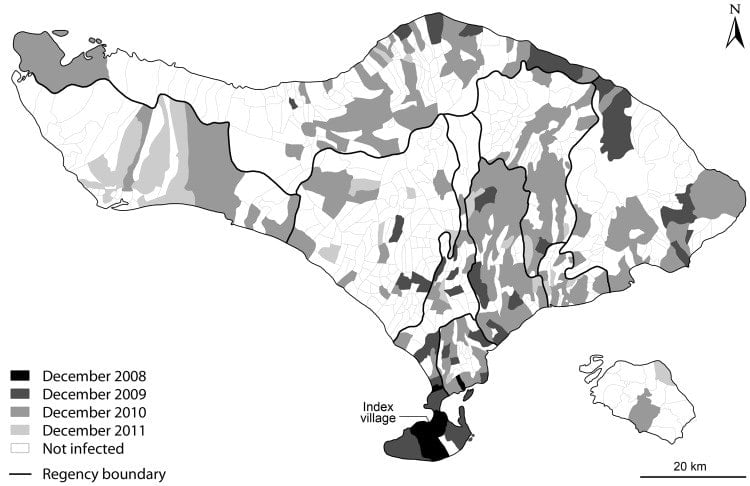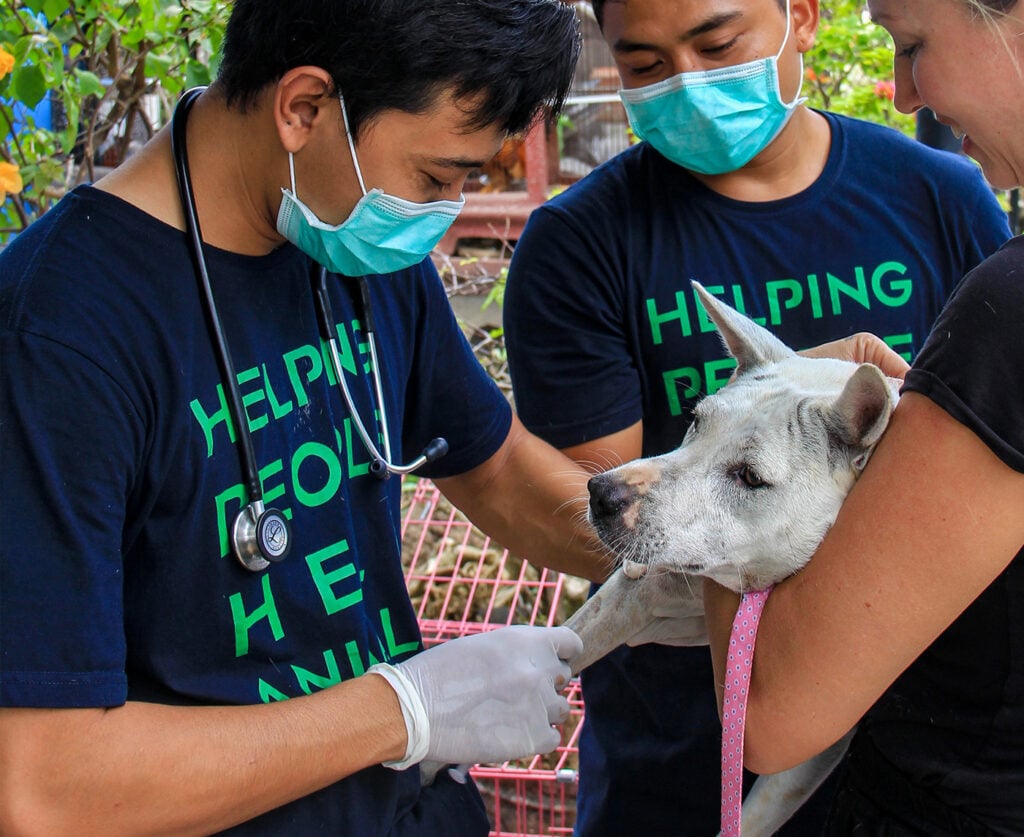A recent incident involving an Australian tourist highlights the importance of rabies awareness for anyone visiting the Island of the Gods. The tourist, bitten by a monkey, faced a hefty bill of Rp97 million (roughly USD$6,000) for the lifesaving rabies vaccine. This story serves as a stark reminder: while Bali’s beauty is undeniable, taking precautions against rabies is crucial for a safe and worry-free vacation. Dive deeper with us as we explore the realities of rabies in Bali, providing essential information to ensure your dream trip doesn’t turn into a medical nightmare.
What is Rabies?
Rabies is caused by the rabies virus, which is present in the saliva of infected animals. The virus typically enters the human body through bites or scratches from infected animals. It travels through the nervous system to the brain, causing inflammation and ultimately death if not treated promptly. Early symptoms of rabies in humans include fever, headache, and general weakness, progressing to more severe neurological symptoms such as anxiety, confusion, and paralysis.
Rabies in Bali: Facts and Key Numbers
In some parts of the world, including Bali, stray dogs are a major source of rabies transmission. It is important to note that rabies is almost always fatal once symptoms appear, which is why it is crucial to seek medical attention immediately if you suspect you have been exposed to the virus. Rabies can also be transmitted through non-bite exposures, such as scratches, abrasions, or open wounds that come into contact with the saliva of an infected animal.
Bali has had a significant issue with rabies since an outbreak began in 2008. Despite efforts to control the disease, rabies remains a public health concern. Here are some key facts and figures:
- Initial Outbreak: The first confirmed case of rabies in Bali was reported in 2008.
- Human Cases: Since the outbreak, there have been hundreds of confirmed human rabies cases and numerous fatalities.
- Animal Cases: Dogs are the primary carriers of rabies in Bali, with thousands of cases reported among the canine population.
- Vaccination Campaigns: Bali has undertaken extensive vaccination campaigns, vaccinating millions of dogs since the outbreak.
- Data from the Indonesian Ministry of Health recorded 31,113 rabies bite cases as of April 2023.
- Between 2008 and 2020, more than 2 million dogs were vaccinated as part of these efforts.

Major Sources of Rabies Transmission in Bali
The primary source of rabies transmission in Bali is through bites from infected dogs. However, other animals, such as monkeys, can also be carriers. Key sources of transmission include:
- Stray Dogs: The high number of stray and free-roaming dogs in Bali increases the risk of rabies transmission. Since 2008, thousands of dogs have been reported to be rabies-positive. By 2010, approximately 30,000 dogs were reported to be rabies-positive.
- Monkeys: Monkeys, especially in tourist areas like Ubud, can also carry and transmit the virus.
Prevention Measures by the Bali Government and NGOs

The Bali government has implemented several measures to control and prevent the spread of rabies:
- Mass Vaccination: Regular mass vaccination campaigns for dogs have been conducted to create herd immunity. In 2023, as part of the World Rabies Day 2023 initiative, the Bali government vaccinated over 1,000 animals, mostly dogs and cats. It’s important to note that these vaccinations are preventative and target healthy animals, not those already carrying rabies.
- Stray Dog Management: Efforts to control the stray dog population through sterilization and relocation programs. There are many Stray Dog Rehabilitation Bali, which are rehabilitating stray dogs in Bali so that in time they may be ready for adoption by a loving family. Another to follow is Bali Pet Crusaders.
- Public Awareness Campaigns: Educating the public on rabies prevention, recognizing symptoms, and proper responses to bites. Don’t buy, please adopt!
- Quick Response Teams: Establishing rapid response teams to handle reported cases of animal bites and suspected rabies.
What to Do If You Get Bitten by Stray Dogs or Monkeys
If you are bitten by a stray dog or monkey in Bali, it is crucial to take immediate action:
Clean the Wound
- Immediate Washing: As soon as possible, thoroughly wash the bite wound with soap and clean, running water. This should be done for at least 15 minutes to help remove saliva and potential rabies virus particles.
- Why It’s Important: Washing the wound promptly can significantly reduce the risk of rabies infection by physically removing the virus from the site of entry.
Disinfect the Wound
- Apply Antiseptic: After washing, apply a disinfectant such as iodine, alcohol, or any other antiseptic solution to the wound. This helps to kill any remaining virus particles and further reduce the risk of infection.
Control Bleeding
- Pressure Application: If the wound is bleeding heavily, apply gentle pressure with a clean cloth or sterile gauze to control the bleeding.
- Avoid Bandaging: Do not bandage the wound tightly, as it is important to allow it to breathe and continue draining any infected fluids.
Seek Medical Attention Immediately
- Nearest Medical Facility: Go to the nearest medical facility or emergency room as soon as possible. It is essential to receive professional medical evaluation and treatment.
- Inform Healthcare Provider: Clearly inform the healthcare provider that you have been bitten by a potentially rabid animal. This information is crucial for them to provide appropriate care.
Post-Exposure Prophylaxis (PEP)
- Start PEP Immediately: Begin a series of rabies vaccinations without delay. Post-exposure prophylaxis (PEP) is a series of rabies vaccines given after a potential exposure to prevent the virus from causing disease.
- First Dose: The first dose should be administered as soon as possible after the bite.
- Follow-Up Doses: Subsequent doses are typically given on days 3, 7, and 14 after the initial dose. In some cases, a fifth dose may be recommended on day 28.
- Human Rabies Immunoglobulin (HRIG): Depending on the severity of the bite and the medical guidelines, you may also receive HRIG, which provides immediate passive immunity by neutralizing the virus at the site of the wound.
Report the Incident
- Local Authorities: Report the bite incident to local health authorities or animal control services. This helps them track rabies cases and take necessary actions to prevent further incidents.
- Animal Observation: If possible, inform authorities about the animal involved so it can be captured and observed for signs of rabies.
The cost for a rabies shot in Bali
In the case of the viral news back then, it was reported that the victim didn’t report to the Monkey Forest team. From the Monkey Forest management will provide clinic for first aid with professional nurses for visitors if they experience monkey bites.
The cost of a rabies vaccine series in Bali can vary depending on the healthcare provider you choose and their location. Here’s a breakdown:
- Public Healthcare: Ubud Puskesmas, the Ubud public health center, offers the entire 4-shot rabies vaccine regimen for a much more affordable price. You can expect to pay around 2,040,000 Indonesian Rupiah (IDR), which is roughly $137 USD in total.
- Private Providers: Some travelers on TripAdvisor have reported paying upwards of $5,000 for the 4 shots at private clinics. However, this appears to be an outlier.
Generally, opting for public healthcare facilities like Puskesmas will offer a significantly lower cost for the rabies vaccine compared to private providers in Bali.
- Clean the Wound: Wash the bite wound thoroughly with soap and water for at least 15 minutes.
- Disinfect: Apply an antiseptic such as iodine or alcohol to the wound.
- Seek Medical Attention: Visit the nearest medical facility as soon as possible. Inform the healthcare provider that you have been bitten by a potentially rabid animal.
- Post-Exposure Prophylaxis (PEP): Begin a series of rabies vaccinations immediately. This is crucial in preventing the virus from progressing.
FAQ
The risk of rabies from monkeys in Bali is considered low, but general rabies precautions are still important. If you’re concerned, discuss pre-exposure vaccination with your doctor before your trip.
While the risk might be low depending on your plans, consider a pre-exposure rabies vaccine – it’s cheaper than post-exposure treatment. Talk to your doctor before your trip – they can assess your individual risk and recommend the best course of action for a worry-free adventure.
Yes, Bali does have rabies. It’s not rabies-free, meaning the virus is present in the animal population. However, the risk of exposure for tourists can be very low depending on your activities.
Rabies snuck into Bali around 2008, likely via an infected dog from a neighboring island. The lack of prior rabies control allowed the virus to spread quickly, but ongoing vaccination programs and awareness campaigns are working to keep the situation under control.
According to some sources, over 100 people have died from rabies in Bali since its introduction in 2008.


